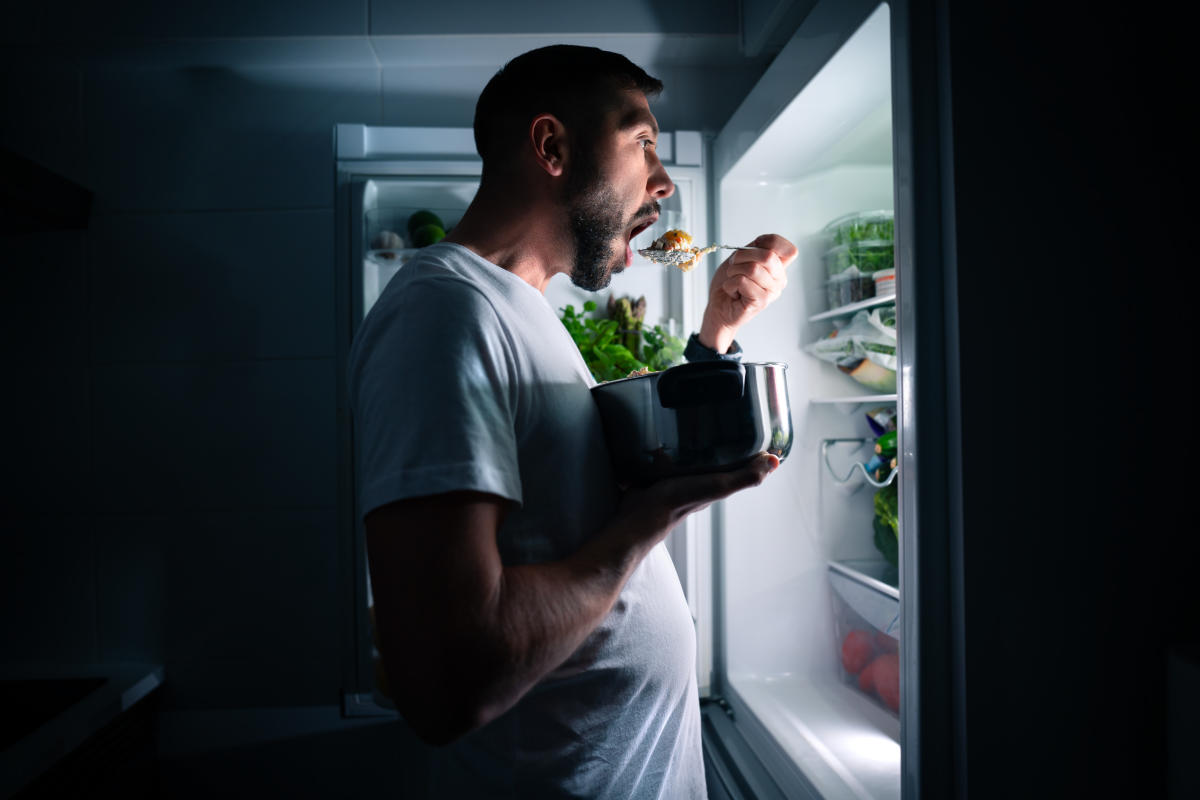
Got a case of the late-night munchies? You’re far from alone. According to one study, up to 59% of adults consume calories after 9 p.m. Not surprisingly, nighttime snacks tend to be less healthy, with comfort foods like ice cream, chips and chocolate among the most popular choices. (Celery sticks and hummus simply don’t cut it when you’re exhausted and emotionally fried).
While the occasional late-night snack isn’t likely to ruin your health, the effects of frequent midnight munchies can add up over time. Here’s how this type of snacking can impact your health and what to reach for when that late-hour hunger pang strikes:
Does late-night snacking lead to weight gain and other health issues?
While the habit might seem fairly harmless, snacking late at night — especially after 11 pm — can increase your risk of dying from all causes, cancer and diabetes, according to observational research. However, this risk disappears when nighttime eating consists of low-energy-density foods, like fruits and vegetables.
Advertisement
Advertisement
Newsletter: The Yodel
Trusted news and daily delights, right in your inbox
See for yourself — The Yodel is the go-to source for daily news, entertainment and feel-good stories.
Eating late at night is also associated with an increased likelihood of being overweight or obese, high blood pressure, metabolic syndrome, cardiovascular disease, inflammation, GERD (chronic heartburn) and — not surprisingly — disrupted sleep. We’ve all had moments when we’ve eaten too much before bed, leaving us restless and uncomfortable.
But it’s not all bad news for late-night snackers. A growing body of research indicates that nibbling at night may help preserve and build muscle in older adults and athletes, especially when that snack features protein.
5 healthy midnight snack options
So what should you choose if you need a midnight snack? Here are a few ideas from registered dietitians:
Greek yogurt: Yogurt in general is a rich source of magnesium, which has been shown to promote sleep. Greek yogurt in particular is loaded with leucine, an amino acid that promotes muscle protein synthesis — an important consideration for older adults who are vulnerable to muscle loss, as well as athletes. The probiotics in Greek yogurt may also help calm your gastrointestinal tract before you hop into bed.
Advertisement
Advertisement
Roasted nuts: Amy Davis, a registered dietitian, recommends eating nuts if you need a snack before bed. “Packed with healthy fats, protein, magnesium and tryptophan, nuts provide sleep-supporting and satiating nutrients to help curb hunger at night.” Tryptophan is a precursor to melatonin, which promotes sleepiness.
Cottage cheese with a drizzle of honey: Alyssa Simpson, a digestive health dietitian, recommends cottage cheese with honey as a pre-bedtime snack. “Cottage cheese contains tryptophan, which supports melatonin production to help you sleep, while honey provides natural sweetness to curb cravings without causing a blood sugar spike,” says Simpson.
Kiwifruit: Kiwis are a source of melatonin and rich in vitamin C, which fights inflammation. Early studies indicate that eating two kiwis before bed may improve sleep duration and quality and decrease nighttime awakenings.
Edamame: Edamame is a rich source of tryptophan and high-quality protein, making them an excellent choice to support sleep, curb hunger and build muscle overnight. They’re also fun to shell and a good alternative to other savory snacks like chips, especially if you’re someone who seeks snacks out of boredom.
Food to avoid late at night
Certain foods can set you up for a poor night’s sleep. Here are a few things to avoid when the midnight munchies strike:
Advertisement
Advertisement
-
Fatty foods like french fries and cake tend to digest more slowly and can leave you feeling heavy and uncomfortably full. Fatty food intolerance (essentially, trouble digesting greasy foods) is common as we age, and eating these foods prior to bed may leave you with an upset stomach in the middle of the night.
-
Acidic foods such as tomatoes, citrus and fruit juices are well-known heartburn triggers and are also not recommended before bed.
-
Caffeine-containing foods and beverages like coffee, soda, tea and chocolate are also midnight-snacking no-nos for obvious reasons. Caffeine interferes with natural sleep-wake signals, resulting in delayed sleep onset and shorter sleep for many.
-
High-sodium foods such as canned soups, frozen pizza, pork rinds and pickles are also good to avoid before bed. According to Simpson, “High-sodium foods can cause water retention and dehydration, leaving you feeling bloated and thirsty during the night.”
The last bite
Late-night snacking is incredibly common, especially when you’re stressed, sad or simply haven’t eaten enough during the day. Studies indicate that habitual late-night snacking isn’t good for your health and interrupts sleep. But choosing healthier options like kiwi, yogurt and nuts can offset these effects.
Edwina Clark is a registered dietitian.
